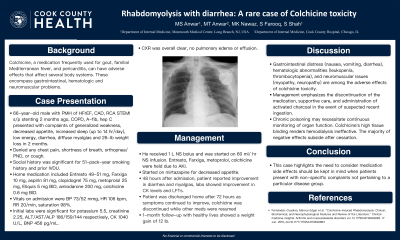Tuesday Poster Session
Category: Colon
P3765 - Rhabdomyolysis with Diarrhea: A Rare Case of Colchicine Toxicity
Tuesday, October 29, 2024
10:30 AM - 4:00 PM ET
Location: Exhibit Hall E

Has Audio

Muhammad Tayyab Anwar, MD
John H. Stroger, Jr. Hospital of Cook County
Chicago, IL
Presenting Author(s)
Muhammad Saad Anwar, MD1, Muhammad Tayyab Anwar, MD2, Maryam Kausar Nawaz, MBBS3, Sibgha Farooq, MBBS4, Shazia Shah, DO1
1Monmouth Medical Center, Robert Wood Johnson Medical School of Rutgers University, Long Branch, NJ; 2John H. Stroger, Jr. Hospital of Cook County, Chicago, IL; 3Lahore Medical and Dental College, Lahore, Punjab, Pakistan; 4University of Health Sciences, Lahore, Punjab, Pakistan
Introduction: Colchicine, a medication frequently used for gout, familial Mediterranean fever, and pericarditis, can have adverse effects that affect several body systems. These encompass gastrointestinal, hematologic and neuromuscular problems. This case report examines the systemic impacts of colchicine, highlighting the need for careful monitoring and management among patients.
Case Description/Methods: We present the case of a 66-year-old male with PMH of HFrEF, CAD, RCA STEMI s/p stenting 2 months ago, COPD, A-fib, hep C who presented with complaints of generalized weakness, decreased appetite, increased sleep (up to 14 hr/day), low energy, diarrhea, diffuse myalgias and 26-lb weight loss in 2 months. He denied any chest pain, shortness of breath, orthopnea/PND, or cough. Social history was significant for 51-pack-year smoking history and prior IVDU. Home medication included Entresto 49-51 mg, Farxiga 10 mg, aspirin 81 mg, clopidogrel 75 mg, metoprolol 25 mg, Eliquis 5 mg BID, amiodarone 200 mg, colchicine 0.6 mg BID. Vitals on admission were BP 73/52 mmg, HR 106 bpm, RR 20/min, saturation 98%. Initial labs were significant for potassium 5.5, creatinine 2.25, ALT/AST/ALP 186/159/144 respectively, CK 1040 U/L, BNP 456 pg/mL. He received 1 L NS bolus and was started on 60 ml/ hr NS infusion. Entresto, Farxiga, metoprolol, colchicine were held due to AKI. Patient was started on mirtazapine for decreased appetite. 48 hours after admission, patient reported improvement in diarrhea and myalgias, labs showed improvement in CK levels and LFTs. Patient was discharged home after 72 hours as symptoms continued to improve, colchicine was discontinued while other meds were resumed. 1-month follow-up with healthy lives showed a weight gain of 12 lb.
Discussion: Gastrointestinal distress (nausea, vomiting, diarrhea), hematologic abnormalities (leukopenia, thrombocytopenia), and neuromuscular issues (myopathy, neuropathy) are among the adverse effects of colchicine toxicity. Management emphasizes the discontinuation of the medication, supportive care, and administration of activated charcoal in the event of suspected recent ingestion. Chronic poisoning may necessitate continuous monitoring of organ function. Colchicine's high tissue binding renders hemodialysis ineffective. The majority of negative effects subside after cessation. This case highlights the need to consider medication side effects should be kept in mind when patients present with non-specific complaints not pertaining to a particular disease group.
Disclosures:
Muhammad Saad Anwar, MD1, Muhammad Tayyab Anwar, MD2, Maryam Kausar Nawaz, MBBS3, Sibgha Farooq, MBBS4, Shazia Shah, DO1. P3765 - Rhabdomyolysis with Diarrhea: A Rare Case of Colchicine Toxicity, ACG 2024 Annual Scientific Meeting Abstracts. Philadelphia, PA: American College of Gastroenterology.
1Monmouth Medical Center, Robert Wood Johnson Medical School of Rutgers University, Long Branch, NJ; 2John H. Stroger, Jr. Hospital of Cook County, Chicago, IL; 3Lahore Medical and Dental College, Lahore, Punjab, Pakistan; 4University of Health Sciences, Lahore, Punjab, Pakistan
Introduction: Colchicine, a medication frequently used for gout, familial Mediterranean fever, and pericarditis, can have adverse effects that affect several body systems. These encompass gastrointestinal, hematologic and neuromuscular problems. This case report examines the systemic impacts of colchicine, highlighting the need for careful monitoring and management among patients.
Case Description/Methods: We present the case of a 66-year-old male with PMH of HFrEF, CAD, RCA STEMI s/p stenting 2 months ago, COPD, A-fib, hep C who presented with complaints of generalized weakness, decreased appetite, increased sleep (up to 14 hr/day), low energy, diarrhea, diffuse myalgias and 26-lb weight loss in 2 months. He denied any chest pain, shortness of breath, orthopnea/PND, or cough. Social history was significant for 51-pack-year smoking history and prior IVDU. Home medication included Entresto 49-51 mg, Farxiga 10 mg, aspirin 81 mg, clopidogrel 75 mg, metoprolol 25 mg, Eliquis 5 mg BID, amiodarone 200 mg, colchicine 0.6 mg BID. Vitals on admission were BP 73/52 mmg, HR 106 bpm, RR 20/min, saturation 98%. Initial labs were significant for potassium 5.5, creatinine 2.25, ALT/AST/ALP 186/159/144 respectively, CK 1040 U/L, BNP 456 pg/mL. He received 1 L NS bolus and was started on 60 ml/ hr NS infusion. Entresto, Farxiga, metoprolol, colchicine were held due to AKI. Patient was started on mirtazapine for decreased appetite. 48 hours after admission, patient reported improvement in diarrhea and myalgias, labs showed improvement in CK levels and LFTs. Patient was discharged home after 72 hours as symptoms continued to improve, colchicine was discontinued while other meds were resumed. 1-month follow-up with healthy lives showed a weight gain of 12 lb.
Discussion: Gastrointestinal distress (nausea, vomiting, diarrhea), hematologic abnormalities (leukopenia, thrombocytopenia), and neuromuscular issues (myopathy, neuropathy) are among the adverse effects of colchicine toxicity. Management emphasizes the discontinuation of the medication, supportive care, and administration of activated charcoal in the event of suspected recent ingestion. Chronic poisoning may necessitate continuous monitoring of organ function. Colchicine's high tissue binding renders hemodialysis ineffective. The majority of negative effects subside after cessation. This case highlights the need to consider medication side effects should be kept in mind when patients present with non-specific complaints not pertaining to a particular disease group.
Disclosures:
Muhammad Saad Anwar indicated no relevant financial relationships.
Muhammad Tayyab Anwar indicated no relevant financial relationships.
Maryam Kausar Nawaz indicated no relevant financial relationships.
Sibgha Farooq indicated no relevant financial relationships.
Shazia Shah indicated no relevant financial relationships.
Muhammad Saad Anwar, MD1, Muhammad Tayyab Anwar, MD2, Maryam Kausar Nawaz, MBBS3, Sibgha Farooq, MBBS4, Shazia Shah, DO1. P3765 - Rhabdomyolysis with Diarrhea: A Rare Case of Colchicine Toxicity, ACG 2024 Annual Scientific Meeting Abstracts. Philadelphia, PA: American College of Gastroenterology.
